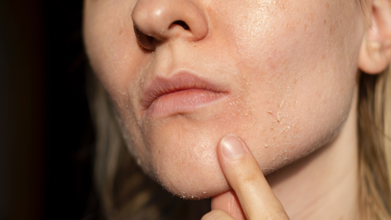- Health Conditions A-Z
- Health & Wellness
- Nutrition
- Fitness
- Health News
- Ayurveda
- Videos
- Medicine A-Z
- Parenting
What Are Exosomes? The Skin Care Ingredient That Target Skin Directly

Credit: Canva
Exosomes have become a buzzword in the beauty and dermatology industry, promising solutions for hair loss and improved skin health. But what exactly are they, and why is everyone talking about them?
Think of exosomes as tiny 'prime' packages delivered to help cells regenerate and heal. These microscopic vesicles, secreted by most human cells, contain genetic material, proteins, lipids, and growth factors that activate cellular repair and rejuvenation.
What Are Exosomes?
A helpful way to understand exosomes is to compare them to a courier service. "Exosomes are like FedEx, carrying bioactive proteins, growth factors, and nucleic acids," Dafna Gershoony, PA-C, CEO of ContōR told a leading publication. "If you imagine your body as a city, exosomes would be the postal service, delivering messages between cells to facilitate communication and repair."
Exosome Therapy: A Breakthrough In Regenerative Skincare
Exosomes are gaining recognition for their potential applications in medicine, particularly in wound healing and inflammation reduction. In aesthetic dermatology, they are being used for faster recovery post-procedures like microneedling and laser treatments. “Exosomes applied topically have shown positive results in skin and hair rejuvenation,” Gershoony notes.
Benefits Of Exosomes in Skincare
Regenerative, restorative, and rejuvenating—these words define exosome therapy. These tiny particles can:- Reduce healing time after skin treatments
- Improve skin firmness and elasticity
- Minimize fine lines, wrinkles, and age-related pigmentation
- Hydrate and nourish the skin
- Stimulate collagen and elastin production
A recent split-face study demonstrated that applying exosomes after microneedling led to an 11.3% increase in elastin production compared to the untreated side.
How Exosomes Compare To Stem Cell Therapy
Exosomes offer similar benefits to stem cell therapy without some of its risks. Unlike live stem cells, exosomes are non-living messenger molecules, reducing concerns about immune rejection, tumour formation, and infections. They also provide more consistent results than platelet-rich plasma (PRP) treatments, which depend on an individual’s natural platelet production.
Safe Ways To Use Exosomes
Currently, exosome treatments are only approved for topical use. “If someone offers to inject exosomes into your skin or scalp—run,” warns Dr. Gohara. “People are applying them post-micro needling or laser procedures to enhance cellular repair, but there are no FDA-approved indications for injectable exosome treatments.”Choosing the Right Exosome Therapy
To ensure safety and efficacy, healthcare experts advise seeking treatment from a board-certified dermatologist. Green flags to look for include human-derived, cell-free products such as platelet-derived exosomes, which naturally support skin healing and regeneration. Reputable exosome therapies should come in sterile, single-use vials and be sourced through strict purification processes.
Red Flags To Watch Out For
Since exosome-based skincare is a relatively new field, consumers should be cautious of misleading claims. Experts advise against using exosome products from companies that lack FDA studies or transparency about sourcing. Some over-the-counter serums claiming to contain exosomes may actually use plant-based versions, which do not interact effectively with human cells.Exosomes In Over-The-Counter Skincare
While some skincare brands now offer exosome-infused serums, their effectiveness depends on formulation stability. “Exosomes have a short half-life and must be stored at precise temperatures to remain viable,” warns Gershoony. Some companies, like Plated SkinScience and Angela Caglia’s Cell Forté Serum, claim to have developed shelf-stable exosome formulas, but dermatologists remain sceptical about their long-term efficacy.When to Incorporate Exosomes Into Your Routine
Exosome treatments should be started in your 30s, as collagen, hyaluronic acid, and natural exosome production start to decline. Anyone looking to even out skin tone, reduce scars, minimize pores, or improve skin texture can benefit from exosome therapy, as per experts.
Future of Exosome Skincare
Regenerative aesthetics is an emerging field, with exosomes at the forefront of anti-ageing and skin rejuvenation research. As clinical trials progress, experts anticipate more targeted applications, expanding beyond cosmetics into broader medical treatments. For now, exosome therapy remains a promising innovation in skincare—one that may revolutionize how we approach ageing and regeneration in the years to come.Working Out For 10 Minutes May Decrease Your Risk Of Colorectal Cancer, Study Proves

Credit: Canva
Performing short and intense exercises that last for about 10 minutes may significantly reduce the risk of colorectal cancer, a British study shows.
Researchers at Newcastle University have found that completing brief workouts increases the concentration of several small molecules in the blood that have previously been linked to reducing inflammation, improving blood vessel function and metabolism.
The findings, which were published in the International Journal of Cancer, also noted that even short bouts of exercise can influence the activity of genes that govern tumor growth and fight against cancer.
Dr Sam Orange, Senior Lecturer in Clinical Exercise Physiology at Newcastle University and lead study author, said of the results, "What’s remarkable is that exercise doesn’t just benefit healthy tissues, it sends powerful signals through the bloodstream that can directly influence thousands of genes in cancer cells.
“It’s an exciting insight because it opens the door to find ways that mimic or augment the biological effects of exercise, potentially improving cancer treatment and, crucially, patient outcomes.
“In the future, these insights could lead to new therapies that imitate the beneficial effects of exercise on how cells repair damaged DNA and use fuel for energy.”
How Does It Work?
The study involved 30 participants, both male and female between the ages of 50–78. All of the participants were overweight or obese (a risk factor of cancer) but otherwise healthy.Researchers had asked each volunteer to complete a short, intense cycling test that lasted about 10 minutes and collected each of their blood samples which were then meticulously analyzed.
After studying about 249 proteins, the experts found nearly 13 protein had increased in their blood flow after the short exercise including interleukin-6 (IL-6), which helps repair the DNA of damaged cells.
When these exercise-induced proteins were applied to colorectal or bowel cancer cells by the scientists in a lab, they discovered that these new proteins could alter the activity of over 1,300 genes, particularly those who were responsible for DNA repair, energy production and cancer cell growth.
As a result, they concluded that performing even small exercises can activate a set of genes in the body's cells that can support efficient use of oxygen and promote energy metabolism. Additionally, the British researchers also discovered that the cell genes which have been previously associated with rapid cell growth were switched off after working out, suggesting that this might aid in controlling cancerous growths in the body.
What Is Colorectal Cancer?
Colorectal or bowel cancer is a common cancer that forms in the tissues of the colon (large intestine) or rectum, often starting as non-cancerous growths called polyps that turn cancerous over time.
Despite being treatable and preventable, colorectal cancer is currently the second leading cause of cancer-related deaths worldwide. Over 70,000 new cases of colorectal cancer occur annually in India, making it the fourth most common cancer in the country.
Typical symptoms usually include :
- Blood in or on the stool
- Changes in bowel habits (diarrhea, constipation, narrower stools)
- Abdominal discomfort, cramps, gas, or pain
- Feeling that your bowel doesn't empty completely
- Weakness, fatigue, or unexplained weight loss
Expert Explains: Why Do Allergies And Rashes Increase In Winter? According To Dermatologist

Credits: iStock
When temperature drops, so does the moisture even in your skin. This is what leads to a rash or allergies. In fact, with changes in temperature, and winters, our lifestyle changes too, this could also be the reason why we experience a winter rash, or allergies. To understand this better, Health and Me spoke to Dr Navjot Arora, Consultant Dermatologist, Dermaheal Skin and Clinic at Dwarka, Delhi, who explained that allergies and skin rashes tend to increase during winter due to both, environmental factors and changes in skin health. "Cold temperatures and low humidity levels reduce moisture in the air, leading to excessive dryness of the skin. When the skin becomes dry, its natural protective barrier weakens. This makes it more prone to irritation, inflammation, and allergic reactions."
Why Does Winter Weather Increase Chances Of Rashes And Allergies?
The doctor explains that during winter, people tend to stay indoors more, and it also increases their exposure to allergens like dust mites, mold, pet dander, and chemical fumes from heaters and cleaning products. "Limited ventilation and closed spaces allow these allergens to build up, triggering allergic responses and skin rashes, especially in individuals with sensitive skin or pre-existing conditions like eczema."
Cold weather also affects blood circulation to the skin. Reduced blood flow can slow down the skin’s repair process and weaken its defense against irritants and allergens. As a result, chronic skin conditions such as eczema, psoriasis, and contact dermatitis often worsen in winter, leading to itching, redness, flaking, and rashes.
Lifestyle Changes In Winter
Doctor also points out that during winters, our bathing habit changes. Dr Arora says, "Frequent hot showers strip away the skin’s natural oils, increasing dryness and irritation. In addition, wearing heavy woolen or synthetic clothing can cause friction, sweating, and contact allergies, particularly in skin folds, which can further contribute to rashes."
Common Symptoms Of Winter Rashes
- flushing
- swelling
- itching
- flaking skin
- sensitivity
- bumps
- blisters
If not treated well, or in time, it can develop into more serious health threat, especially if you have a family history of
- eczema or another type of dermatitis
- psoriasis
- rosacea
- allergies
- asthma
- sensitive skin
What Are The Cures To Winter Rashes And Allergies?
The rise in allergies and rashes during winter is largely linked to dry weather, indoor allergen exposure, and skin barrier damage. Maintaining proper skin hydration, avoiding harsh soaps, limiting hot water exposure, and wearing skin-friendly fabrics can help reduce the risk of winter-related allergies and skin rashes.
Moisturizers are usually the first line of care for dry skin because they help trap moisture and prevent further dryness. Apply them multiple times a day, especially after bathing or washing your hands. Thicker options like creams or ointments tend to keep skin hydrated longer than lighter lotions.
Petroleum jelly can also be effective, as it forms a protective barrier that seals in moisture. If you prefer to avoid petroleum-based products, alternatives like Waxelene or Un-Petroleum work in a similar way to reduce moisture loss.
Natural virgin oils, such as coconut oil, may help calm irritated skin and restore hydration. Use them on areas that are not acne-prone, and always do a patch test on a small area for 24 hours before wider application.
Oatmeal-based soaps or oatmeal baths can also help soothe dry, itchy skin. You can buy ready-made oatmeal soaps or add finely ground oats to a warm bath and soak for about 10 minutes.
For itching and inflammation, topical hydrocortisone creams, available over the counter or by prescription, may provide relief. Always follow the instructions on the label or use them as advised by a doctor.
Disclaimer: This is not a substitute for actual prescribed medicine. Please consult a doctor before you purchase any medicine or ointment for your rashes.
Are You Taking Clonazepam? NHS Issues Urgent Safety Advice

Credits: Canva
The NHS has released updated guidance for people who are currently taking clonazepam, a commonly prescribed medicine that belongs to the benzodiazepine group. According to the health service, clonazepam is often used to control seizures or fits linked to epilepsy, ease involuntary muscle spasms, and help manage panic disorders. It is also prescribed in some cases for people with restless legs syndrome (RLS). NHS Inform notes that “around 1 in 10 people experience restless legs syndrome at some stage in their life.”
Explaining how the drug works, the NHS says it increases levels of gamma-aminobutyric acid (GABA), a chemical in the brain that has a calming effect. By boosting GABA, clonazepam can reduce anxiety, prevent seizures or fits, and relax tight or overactive muscles.
Who Can Take Clonazepam?
Clonazepam is only available on prescription and comes as tablets or a liquid. Most adults aged 18 and over can take either form. In certain cases, children as young as one month old may be prescribed clonazepam to treat epilepsy, as per NHS.
That said, there are situations where extra caution is needed. People who are due to have surgery or dental treatment, those who are pregnant, trying to conceive, or who have sleep-related conditions may be advised to stop taking the medicine. However, these are not the only groups the NHS says should be careful.
Clonazepam is not suitable for everyone. Before starting treatment, patients are advised to tell their doctor if they:
- have ever had an allergic reaction to clonazepam or any other medicine
- have myasthenia gravis, a condition that causes muscle weakness
- have sleep apnoea, which affects breathing during sleep
- have lung, liver, or kidney problems
- have spinal or cerebellar ataxia, which can cause shakiness, poor balance, and slurred speech
- have had problems with alcohol or drug use in the past
- have recently experienced bereavement, depression, or thoughts of self-harm or suicide
- have been diagnosed with a personality disorder
- are trying to get pregnant, are already pregnant, or are breastfeeding
- are due to have a general anaesthetic for an operation or dental procedure
What Are The Side Effects Of Clonazepam?
Like many medicines, clonazepam can cause side effects. Common effects, which affect more than 1 in 100 people, include disturbed sleep such as vivid dreams, feeling sleepy during the day, light-headedness, dizziness, unsteadiness, and muscle weakness.
When it comes to long-term use, the NHS warns that clonazepam can lead to withdrawal symptoms if taken for a prolonged period. Because of this risk, people who have been prescribed the drug for more than four weeks may have their dose reduced slowly when stopping treatment, rather than stopping suddenly.
The NHS also stresses that this is not a complete list of side effects. Patients are advised to read the information leaflet that comes with their medicine for full details.
Clonazepam: Serious Side Effects To Watch Out For
Although uncommon, some people may experience serious side effects while taking clonazepam. The NHS advises contacting a doctor or calling 111 immediately if you notice:
- yellowing of the whites of the eyes or skin, which may be less noticeable on darker skin tones, as this could point to liver problems
- seeing or hearing things that are not there, or believing things that are untrue
- problems with coordination or controlling movements
- swollen ankles, a fast heartbeat, coughing, and extreme tiredness, which could be signs of heart issues
- easy bruising, fatigue, nosebleeds, and breathlessness, which may indicate blood disorders
- changes in mood, such as talking more than usual, feeling unusually excited, restless, irritable, or aggressive, which are more likely in children or adults over 65
- Anyone experiencing memory problems, such as difficulty remembering things or amnesia, is advised to book an appointment with their doctor.
In rare cases, clonazepam can trigger a serious allergic reaction known as anaphylaxis.
Disclaimer: This article is for informational purposes only and is not intended as a substitute for professional medical advice, diagnosis, or treatment. Always consult a qualified doctor, pharmacist, or healthcare provider before starting, stopping, or changing the dosage of any medication.
© 2024 Bennett, Coleman & Company Limited

